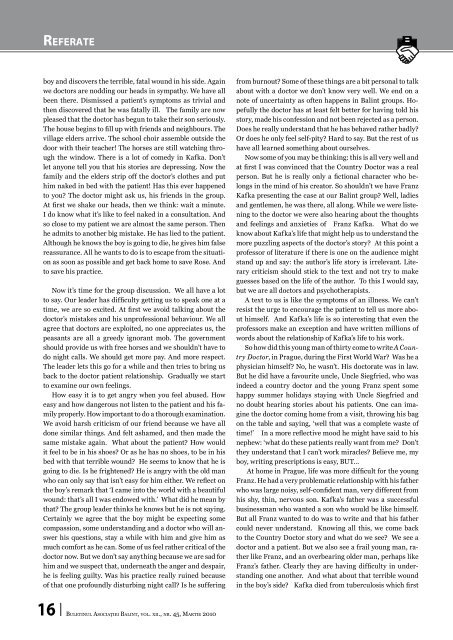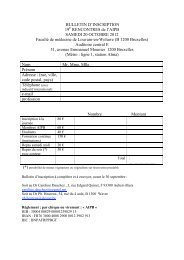Marie 2010
martie 2010 - Psychodrame Balint
martie 2010 - Psychodrame Balint
Create successful ePaper yourself
Turn your PDF publications into a flip-book with our unique Google optimized e-Paper software.
Referateboy and discovers the terrible, fatal wound in his side. Againwe doctors are nodding our heads in sympathy. We have allbeen there. Dismissed a patient’s symptoms as trivial andthen discovered that he was fatally ill. The family are nowpleased that the doctor has begun to take their son seriously.The house begins to fill up with friends and neighbours. Thevillage elders arrive. The school choir assemble outside thedoor with their teacher! The horses are still watching throughthe window. There is a lot of comedy in Kafka. Don’tlet anyone tell you that his stories are depressing. Now thefamily and the elders strip off the doctor’s clothes and puthim naked in bed with the patient! Has this ever happenedto you? The doctor might ask us, his friends in the group.At first we shake our heads, then we think: wait a minute.I do know what it’s like to feel naked in a consultation. Andso close to my patient we are almost the same person. Thenhe admits to another big mistake. He has lied to the patient.Although he knows the boy is going to die, he gives him falsereassurance. All he wants to do is to escape from the situationas soon as possible and get back home to save Rose. Andto save his practice.Now it’s time for the group discussion. We all have a lotto say. Our leader has difficulty getting us to speak one at atime, we are so excited. At first we avoid talking about thedoctor’s mistakes and his unprofessional behaviour. We allagree that doctors are exploited, no one appreciates us, thepeasants are all a greedy ignorant mob. The governmentshould provide us with free horses and we shouldn’t have todo night calls. We should get more pay. And more respect.The leader lets this go for a while and then tries to bring usback to the doctor patient relationship. Gradually we startto examine our own feelings.How easy it is to get angry when you feel abused. Howeasy and how dangerous not listen to the patient and his familyproperly. How important to do a thorough examination.We avoid harsh criticism of our friend because we have alldone similar things. And felt ashamed, and then made thesame mistake again. What about the patient? How wouldit feel to be in his shoes? Or as he has no shoes, to be in hisbed with that terrible wound? He seems to know that he isgoing to die. Is he frightened? He is angry with the old manwho can only say that isn’t easy for him either. We reflect onthe boy’s remark that ‘I came into the world with a beautifulwound: that’s all I was endowed with.’ What did he mean bythat? The group leader thinks he knows but he is not saying.Certainly we agree that the boy might be expecting somecompassion, some understanding and a doctor who will answerhis questions, stay a while with him and give him asmuch comfort as he can. Some of us feel rather critical of thedoctor now. But we don’t say anything because we are sad forhim and we suspect that, underneath the anger and despair,he is feeling guilty. Was his practice really ruined becauseof that one profoundly disturbing night call? Is he suffering16Buletinul Asociaţiei Balint, vol. xii., nr. 45, Martie <strong>2010</strong>from burnout? Some of these things are a bit personal to talkabout with a doctor we don’t know very well. We end on anote of uncertainty as often happens in Balint groups. Hopefullythe doctor has at least felt better for having told hisstory, made his confession and not been rejected as a person.Does he really understand that he has behaved rather badly?Or does he only feel self-pity? Hard to say. But the rest of ushave all learned something about ourselves.Now some of you may be thinking: this is all very well andat first I was convinced that the Country Doctor was a realperson. But he is really only a fictional character who belongsin the mind of his creator. So shouldn’t we have FranzKafka presenting the case at our Balint group? Well, ladiesand gentlemen, he was there, all along. While we were listeningto the doctor we were also hearing about the thoughtsand feelings and anxieties of Franz Kafka. What do weknow about Kafka’s life that might help us to understand themore puzzling aspects of the doctor’s story? At this point aprofessor of literature if there is one on the audience mightstand up and say: the author’s life story is irrelevant. Literarycriticism should stick to the text and not try to makeguesses based on the life of the author. To this I would say,but we are all doctors and psychotherapists.A text to us is like the symptoms of an illness. We can’tresist the urge to encourage the patient to tell us more abouthimself. And Kafka’s life is so interesting that even theprofessors make an exception and have written millions ofwords about the relationship of Kafka’s life to his work.So how did this young man of thirty come to write A CountryDoctor, in Prague, during the First World War? Was he aphysician himself? No, he wasn’t. His doctorate was in law.But he did have a favourite uncle, Uncle Siegfried, who wasindeed a country doctor and the young Franz spent somehappy summer holidays staying with Uncle Siegfried andno doubt hearing stories about his patients. One can imaginethe doctor coming home from a visit, throwing his bagon the table and saying, ‘well that was a complete waste oftime!’ In a more reflective mood he might have said to hisnephew: ‘what do these patients really want from me? Don’tthey understand that I can’t work miracles? Believe me, myboy, writing prescriptions is easy, BUT…At home in Prague, life was more difficult for the youngFranz. He had a very problematic relationship with his fatherwho was large noisy, self-confident man, very different fromhis shy, thin, nervous son. Kafka’s father was a successfulbusinessman who wanted a son who would be like himself.But all Franz wanted to do was to write and that his fathercould never understand. Knowing all this, we come backto the Country Doctor story and what do we see? We see adoctor and a patient. But we also see a frail young man, ratherlike Franz, and an overbearing older man, perhaps likeFranz’s father. Clearly they are having difficulty in understandingone another. And what about that terrible woundin the boy’s side? Kafka died from tuberculosis which first



